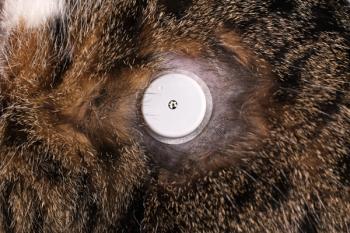
Treatment strategies for diabetics (Proceedings)
Pathogenesis: Insulin-dependent, non-insulin dependent, transient
I. Pathogenesis
A. Insulin-dependent
B. Non-insulin dependent
C. Transient
II. Diagnosis
A. Clinical signs
B. Persistent hyperglycemia
C. Glucosuria
D. Stress-related hyperglycemia
E. Insulin-dependent versus non-insulin dependent
1. difficult to separate
2. often diagnosed by clinical presentation or in retrospect
III. Patient Evaluation
A. Stable versus non stable
1. ketotic
2. acidotic
3. hyperosmolar
4. hydration status
5. eating/drinking
B. Concurrent disease
1. urinary tract infection
2. concurrent endocrinopathies: cushing's disease, hypothyroidism, hyperthyroidism
3. pancreatitis
4. infections
5. pregnancy
6. reproductively intact
C. Testing
1. CBC
2. Chemistry
3. Urinalysis
a. ketonuria
b. bacteriuria
c. pyuria
4. Urine culture
5. abdominal ultrasound
6. pancreatic lipase immunoreactivity (PLI)
7. insulin-dependent versus non-insulin dependent – no good way to differentiate
D. Treatment for the stable animal
1. ketotic versus non ketotic
2. hospitalization versus non hospitalization
3. Goals of therapy
a. correction of clinical signs
b. control of concurrent disease
c. avoidance of emergency situations
(1) hypoglycemia
(2) ketosis/ketoacidosis
(3) hyperosmolality
Insulin Choices
E. Treatment for the stable feline diabetic
a. diet – low carbohydrate
b. diet + insulin
(1) insulin effects very variable
(2) intermediate-acting; bid
(3) 0.25 U/kg; 1-2 U/cat bid
F. Treatment for the stable canine diabetic
a. diet + insulin
b. high insoluble fiber diet; calorie restriction
c. intermediate-acting insulin;
d. 0.5 U/kg bid
G. Feed bid with insulin
H. Exercise
I. Identification and control of concurrent disease
J. Time for initial control: 4-6 weeks
K. Oral hypoglycemic agents – may worsen disease, especially in cats
a. chromium and vanadium
(1) trace minerals
(2) insulin sensitizers
(3) ineffective in dogs
b. metformin (biguanide) – not effective in diabetic cats as a sole agent
c. glipizide, gyburide (sulfonylurea)
(1) stimulate insulin secretion
(2) NIDDM
(3) worsening of islet cell amyloidosis
L. Alpha-glucosidase Inhibitors
a. acarbose
b. miglitol
c. complex oligosaccharides that inhibit enzymes in the brush border of the small intestine responsible for digestion of carbs
d. in diabetic dogs: acarbose decreased dose of insulin necessary
(1) diarrhea
(2) weight loss
e. 12.5-25 mg/dog at meal time
f. reserved for difficult to control patients
Newsletter
From exam room tips to practice management insights, get trusted veterinary news delivered straight to your inbox—subscribe to dvm360.




